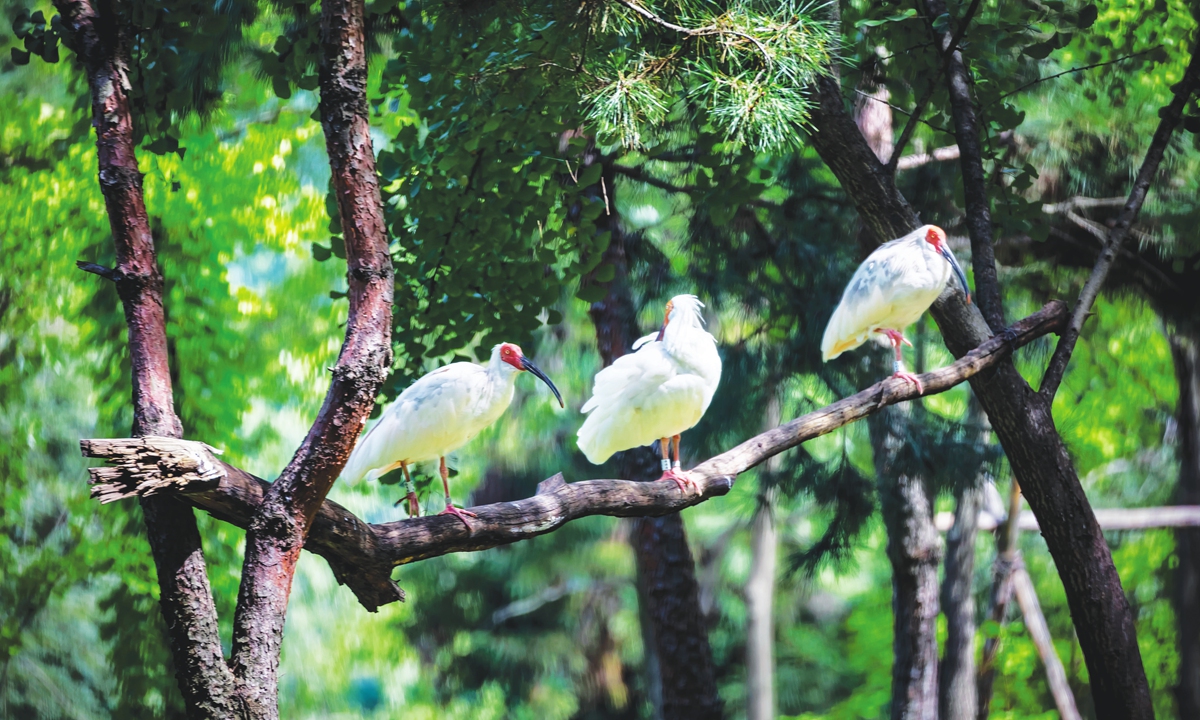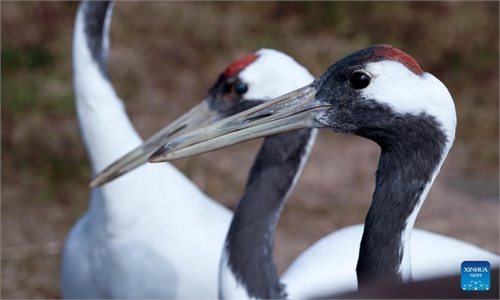ARTS / CULTURE & LEISURE
East Asian countries join hands to protect endangered crested ibis
Banding together

Three crested ibis sit in a tree in Xi'an, Northwest China's Shaanxi Province on September 6, 2022.Photo: VCG
A China-Japan-South Korea friendship exchange program aimed at protecting the endangered crested ibis was launched on Saturday in Shanghai. Experts, diplomats and scholars from the three neighboring countries shared their experiences in improving ecological protection and biodiversity and vowed to put forth more effort in regional cooperation to tackle climate change, environmental pollution and promote the harmonious development of humanity and nature.The crested ibis, also known as an auspicious "fairy bird" or "beauty bird" in Asian culture, was once commonly found in China, the Korean Peninsula, Japan and Russia until the 1960s.
Unfortunately, the crested ibis became extinct on the Korean Peninsula and in Russia in the 1970s. The last six crested ibises spotted in Japan were believed to be the last of the species on Earth, so the Japanese government decided to put them in captivity in 1981 for their protection. Yet the controversial practice turned out to be a failure, as the birds didn't survive. The last one died in 2003, signifying the extinction of the species in Japan.

The crested ibis, often referred to as a "fairy bird" in Asian culture.Photo: VCG
'Beauty bird' revival
A Chinese scientist, Liu Yinzeng, then a research fellow at the Chinese Academy of Sciences (CAS), wasn't willing to accept the idea that crested ibises were extinct in China. In 1978, he led a team to search throughout the country for the bird.
A turning point occurred in May 1981, after Liu and his team had scoured mountains in nine provinces. Two adult crested ibises were spotted in Yang county in Northwest China's Shaanxi Province.
Following the discovery of these seven birds, China launched conservation efforts to protect and preserve the crested ibis. Thus a "fairy bird revival" miracle was created in China based on the sweat, tears and endeavor of numerous Chinese people.
"As a result, there are more than 7,000 crested ibises living in both the wild and captivity in China as of 2022. Habitat areas have expanded from less than five square kilometers at the time of discovery to 16,000 square kilometers today. Besides Shaanxi, the birds are also living in Central China's Henan and East China's Zhejiang provinces," Zhang Zhizhong, director of Wildlife Conservation Department, National Forestry and Grassland Administration, said at the event via a video address on Saturday.
Step by step and phase by phase, the habitats of the crested ibis have been expanded from the depths of the mountains to hills and plains, from a corner of Yangxian county to the entire region of Qinba in Shaanxi and from China to the rest of East Asia, Dang Shuangren, an ecologist and director of Shaanxi Provincial Forestry Administration, told the event.
China is willing to share the "oriental sacred bird" with its neighbors.
"Crested ibises are favored by people across Asia, China has presented 14 provenances' crested ibises to Japan and South Korea since 1985. Currently, Japan and South Korea are home to a total of more than 1,000 crested ibises living in wild and captivity. It's the common wish for Asian countries to restore the crested ibis' original habitats," Dang said.
Cross-nations cooperation urged
Chinese scholars' speeches were echoed by foreign participants at the event including Kim Seung-ho, consul general of the Republic of Korea in Shanghai, and Oku Masafumi, deputy consul general of Japan in Shanghai. Both diplomats said they appreciate China's endeavors and contributions to the protection of the crested ibis and called for more regional and international cooperation in environmental and ecological sectors.
Kim pointed out that in today's world, all countries are actively conducting international exchanges and cooperation in many areas, but international cooperation in environmental protection has achieved little and is still lacking.
In Chinese President Xi Jinping's Report to the 20th National Congress of the Communist Party of China, he elaborated that Chinese modernization is the modernization of harmony between humanity and nature. Humanity and nature make up a community of life. China's protection of the crested ibis is a microcosm of how China is committed to sustainable development and to the principles of prioritizing resource conservation and environmental protection and letting nature restore itself.
Ahead of UN Biodiversity Conference in Montreal, Canada, in December, the round table "Road leading to the success of CBD COP15, building a shared future for all life on Earth" was held in China on September 26. The importance of joint moves on protecting wildlife at an international level was stressed at the event.
"The Chinese government has always attached great importance to biodiversity conservation. Upholding the concept of harmonious coexistence between humanity and nature, the Chinese government has cooperated to promote biodiversity conservation," said Huang Runsheng, Chinese minister of ecology and environment, during the round table.
Yet to face the challenges ahead, strong guarantees in terms of technology and capital, as well as the broad participation of various governments, NGOs and the public are needed, the meeting concluded.
Successful cross-country cooperation between China, Japan and South Korea demonstrated in the crested ibis case well illustrates how China's solutions and wisdom can play a vital role in maintaining the global ecology, biosecurity and sustainable development, jointly building a global ecological civilization and striving to make COP15 a global a success, said observers of the Shanghai event.
"I hope and expect that South Korea, China and Japan will continue to make persistent effort, trust and benefit each other, learn from each other's strengths and complement each other's weaknesses, further increase environmental protection cooperation, and strive to become a model of cooperation in the international community," Kim said.
"Large-scale natural disasters and extreme weather occur around the world, and Japan is also suffering from the losses caused by natural disasters. Global-scale problems such as the global environment and extreme weather are urgent and require the cooperation of all countries to solve them, thus it's of great significance for the relevant people from Japan, China and South Korea gathered here to discuss the issue of environmental protection through the beautiful crested ibis," Oku said.
He also shared that a new Japanese airline named after the crested ibis was established in Niigata Prefecture, where Sado Island is the only habitat for the bird in Japan. On November 5, the company's No. 1 aircraft had just arrived in Niigata.
Yuan Mindao, vice president of the Chinese People's Association for Friendship with Foreign Countries, said "2022 marks the 50th anniversary of the normalization of diplomatic relations between China and Japan and the 30th anniversary of the establishment of diplomatic relations between China and South Korea. Crested ibises are also ambassadors of friendship in East Asia, and a link between the people of China, Japan and South Korea for friendly cooperation and future discussions. There are new opportunities for the three countries to expand cooperation fields, deepen practical cooperation and benefit the people of the three countries."
Other participants from international enterprises, academic institutions agreed that in tackling the global ecological and environmental challenges, much more cooperation is needed and the pragmatic experience gathered from the successful breeding of crested ibis in China, Japan and South Korea offers a valuable model.
The event was co-organized by People's Associations for Friendship with Foreign Countries of Shanghai and Shaanxi and the forestry administrations from Shanghai and Shaanxi.




